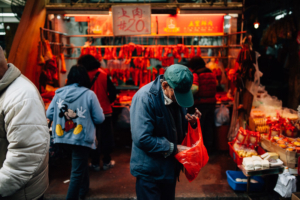Elderly Poverty in Hong Kong
 Hong Kong is a city of two halves: while some enjoy wealth and luxury, 23.6% of the population live in poverty, struggling to share in the city’s economic prosperity. Elderly poverty is a significant problem in Hong Kong, with 45% of citizens aged 65 and older—about 583,600 people—living in poverty. Furthermore, Hong Kong has faced criticism for its inadequate poverty measures, which do not accurately represent the true scale of the issue, suggesting that even more people could be affected than officially recorded. Perhaps more concerning than these high rates is the fact that elderly poverty has increased significantly in recent years, up from 27.7% in 1991.
Hong Kong is a city of two halves: while some enjoy wealth and luxury, 23.6% of the population live in poverty, struggling to share in the city’s economic prosperity. Elderly poverty is a significant problem in Hong Kong, with 45% of citizens aged 65 and older—about 583,600 people—living in poverty. Furthermore, Hong Kong has faced criticism for its inadequate poverty measures, which do not accurately represent the true scale of the issue, suggesting that even more people could be affected than officially recorded. Perhaps more concerning than these high rates is the fact that elderly poverty has increased significantly in recent years, up from 27.7% in 1991.
Causes
Elderly poverty in Hong Kong is driven by several factors, including a prevailing attitude that discourages reliance on welfare. As a result, there is limited government assistance available to provide financial protection for those struggling with poverty. Culturally, there is also an expectation for families to care for their elderly, with the Chinese government introducing a law in 2013 that demands children see and “greet” parents regularly, which made little difference. As times are changing, many families do not want to or are not able to care for their elderly.
While values are changing for some, the state has not adapted to this; existing welfare benefits (particularly the Social Security Allowance Scheme) for older people are rarely enough to cover living costs. Therefore, older adults are often seen collecting recyclable rubbish, such as cardboard and glass, in order to make enough money to survive. Pensions are a real concern, with the city having no pension scheme and many retirement funds being continually offset. This means that many are forced to remain in employment well past retirement age.
Furthermore, many cannot afford the help they desperately need; on average, it takes 19 months to receive subsidized home care services, leaving many older people alone without the support they need to live a fulfilling life.
Organizations Providing Aid
Efforts are underway to reduce elderly poverty in Hong Kong. Oxfam has launched the Concerning Home Care Service Alliance’s “service matching” scheme, which connects caregivers with seniors to assist with daily tasks like cooking, cleaning and accompanying them to appointments. Seniors pay just $0.64 for the service, while caregivers receive a stipend in addition to this small fee.
The Society for Community Organization (SoCO) also advocates for better support for older adults, assisting them in applying for existing welfare programs and accessing health care. These support systems are crucial for improving the quality of life for elderly individuals living in poverty. SoCO assists more than 1,000 seniors to apply for “social security or public housing each year.”
Furthermore, the Elder Academy supports the mental well-being of older adults by partnering them with academic institutions, offering opportunities for lifelong learning and fostering a sense of community inclusion. Last year, the organization received $10 million in government funding, demonstrating a commitment to improving the livelihoods of older adults.
– Eryn Greenaway
Eryn is based in East Sussex, UK and focuses on Global Health for The Borgen Project.
Photo: Flickr
